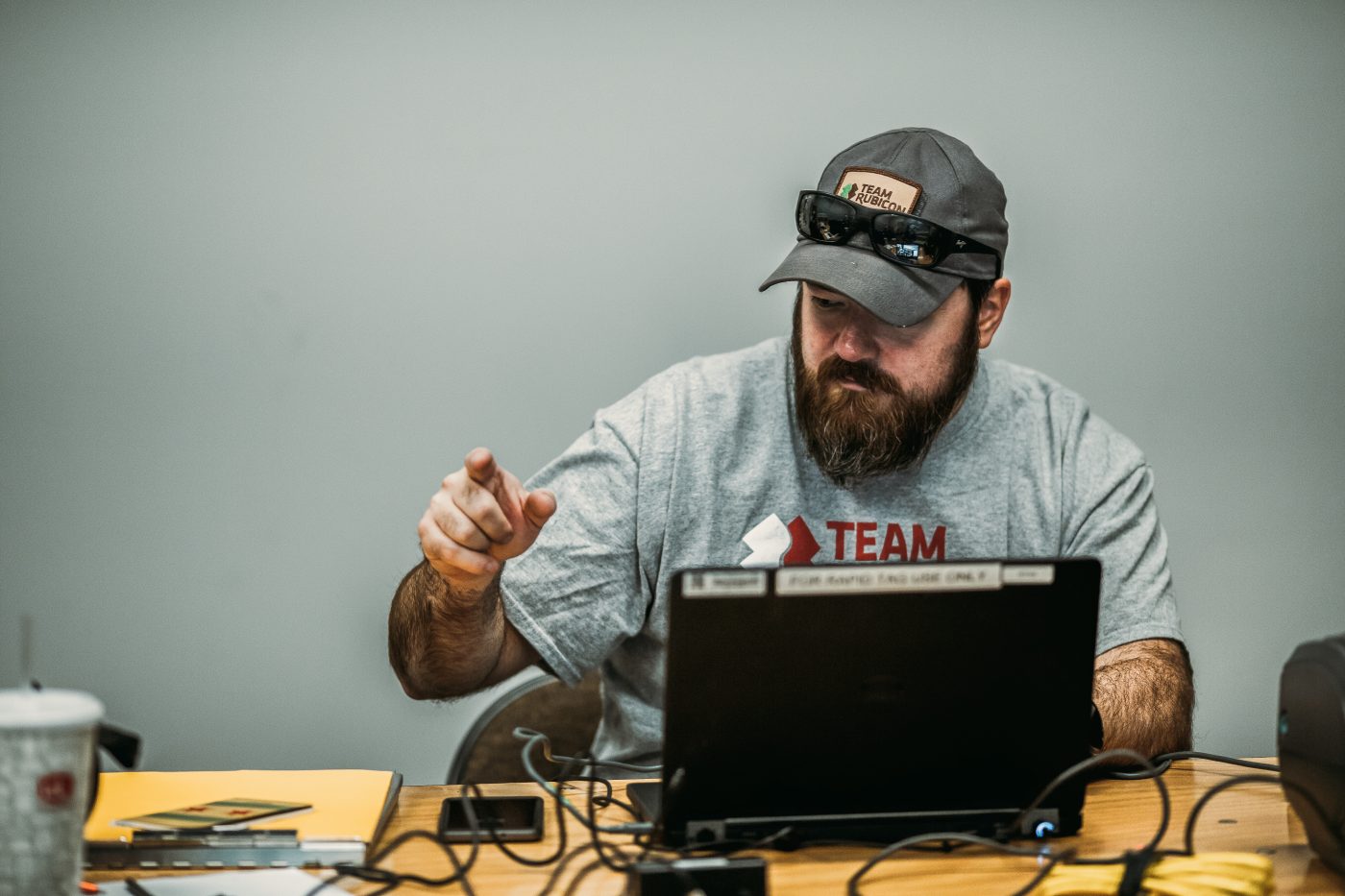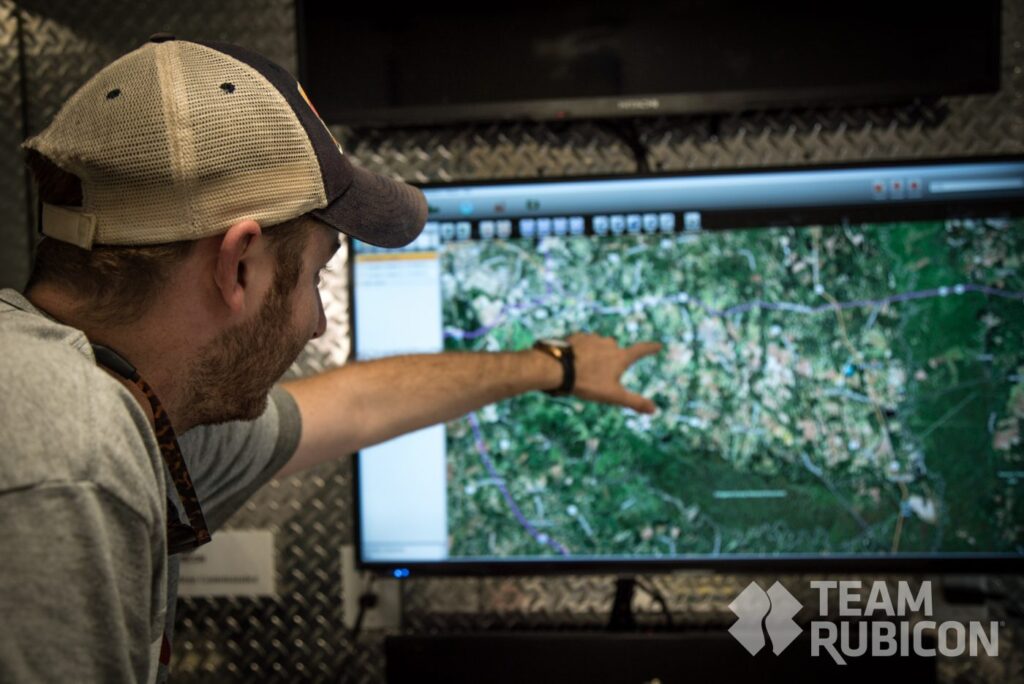When events happen, large or small, Team Rubicon’s National Operations Center (NOC) springs into action to support Team Rubicon operations. Part of that support, is engaging members who can’t otherwise deploy on operations due to school, work, family obligations, or physical limitations. Here are 7 ways you can lend a hand from the comfort of your own home:
WatchCenTR Team – Day in and out, a dedicated team of members scour the map looking at weather and other humanitarian events to provide early warning to Team Rubicon. These members form WatchCenTR and they’re responsible for creating the Daily Threat Brief TR Nation sees every day. If you’d like to participate, email: NationalPlanning@teamrubiconusa.org.

Virtual Operations Support Team – When disasters strike, there’s a massive amount of information that teams sift through to identify the most damaged and most impacted areas. That’s where the Virtual Operations Support Team comes in. They monitor mass media and social media to drive decision-making. During Hurricane Harvey, this team was responsible for monitoring known Twitter hashtags and online databases for personnel requesting rescue, vetting the information, and providing it to the boat rescue teams to expedite rescues of endangered residents. Look out for a notification if Remote Operations are needed and sign-up!
Virtual Phone Operator – One of the quickest ways a survivor can get back into their homes is utilizing Non-Profit Organizations as part of National Voluntary Organizations Active in Disaster to conduct debris removal. But how do those non-profits actually connect with the survivors? Crisis Cleanup, an open-source platform to collect requests for assistance, stands up a virtual call center allowing survivors to call-in and request help from voluntary agencies. Team Rubicon supports this effort by providing members to act as virtual phone operators, collecting survivor information and their needs, which allows voluntary agencies to more quickly deliver services and get the survivor back in their homes. Look out for a notification if Remote Operations are needed and sign-up!
Palantir Operator – Team Rubicon is a data-driven organization, utilizing Palantir extensively to collect, catalog, and analyze information during operations and inform the rest of Team Rubicon’s support functions like Marketing and Communications as well as the Open Initiative. Palantir Operators train members on Structure and Damage Assessments using the Palantir Mobile application as well as provide crucial situational awareness information for Command and General Staffs and government Emergency Managers during approved Federal Emergency Management Agency (FEMA) Public Assistance Programs. Your Deputy Director of Regional Operations has more information on how to become a Palantir Operator.
Geospatial Visualization Team – Utilizing our partnerships with BAE Systems and DigitalGlobe, a specially trained team creates actionable information from pre and post-disaster satellite imagery. This team was instrumental in informing which roadways were open during Operation Shallow Draft, which allowed the boat rescue teams to get to locations provided by the Virtual Operations Support Team with less uncertainty. Later, the Geospatial Visualization Team helped identify suitable Forward Operating Base Locations for Operation Hard Hustle; shortening the time needed for reconnaissance. Training in your Region will roll-out within the next month. Check with your Regional Training Manager for more information.
Incident Weather Team – Having up-to-date weather information is central to everything Team Rubicon does. Whether it’s forecasting the next 7-days worth of weather as part of a Mission Planning Team, identifying cloud-to-ground lightning to ensure the safety of deployed members on an operation, or knowing the amount of precipitation that’s expected to fall during a flood response. Trained members use Baron Weather Services ThreatNet to ensure timely, relevant weather information gets in the hands of mission planners or Command and General Staff. If you’d like to participate, email: Porter@teamrubiconusa.org.

Geographic Information Systems (GIS) Technician – As Team Rubicon continues to professionalize, the need for informative maps grows. Whether that’s mapping out key areas of destruction, Forward Operating Bases, or Points of Distribution, to identifying areas prone to low-attention disasters and informing the greater NVOAD community, Team Rubicon is committed to sharing information to all partners. GIS trained personnel fuse information from satellite imagery, Humanitarian Data Exchange, FEMA’s Open Data Initiative and produce informative maps that target business development, operational activities, and partner support. If you’d like to participate, email: Porter@teamrubiconusa.org.
Team Rubicon is committed to engaging as many members as possible during a disaster. If any of these opportunities pique your interest, keep an eye out for the training events in Roll Call or notifications on the Sit Room looking for support. See you on the next one!



